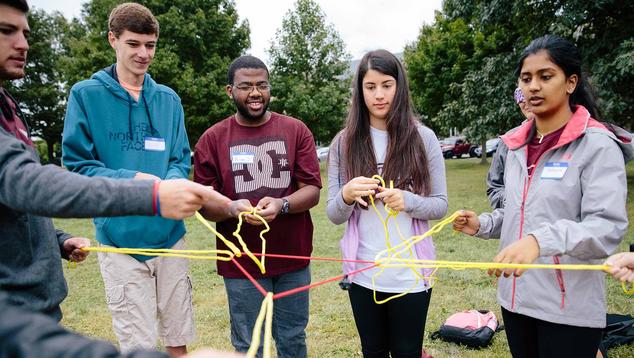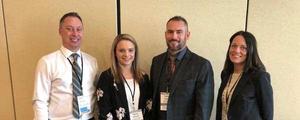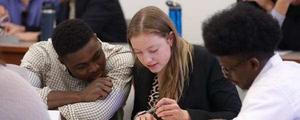Story Highlights
- Virginia Tech was nominated for the CliftonStrengths® for Students Award
- They integrate strengths® into their aspirations for student learning
- Strengths® serve as a way to build trust and have important conversations
The Don Clifton Strengths® for Students Award recognizes institutions doing exceptional work in integrating CliftonStrengths® for Students across their districts and campuses. We will be featuring the winners in a series of articles to highlight their accomplishments and share how they are using strengths® to help students thrive in school and all areas of their lives.
"Strengths® for what?" is the question Interim Vice President for Student Affairs Frank Shushok knew Virginia Tech had to answer if they wanted CliftonStrengths® for Students to have a meaningful and lasting effect on campus. Eleven years later, it seems safe to say they got it right. By connecting CliftonStrengths® to the school's five aspirations for student learning, they've woven it into campus culture and made it a tool to help students answer difficult questions about who they are, who they want to be, and the unique way they can make a difference in the world.
1. Commit to Unwavering Curiosity
When Frank began working at Virginia Tech in 2009, one of the first things he did was take his staff on a retreat to start thinking about "what it is we dream for our students?" The aspirations for student learning were born from these conversations and the way they intersect with strengths®.
"We were using strengths® as we developed the aspirations, and the way it aligned helped us understand what a valuable tool it would be if we could use it as a mechanism for these bigger, broader, really important questions and outcomes," says Frank.
For instance, curiosity and the way curiosity is enacted depends on people's natural inclinations. Using strengths® helps define what a lifelong commitment to intellectual development looks like for each individual.
"We want people to think about what it means to be authentic with who they are and see where there are gaps between who they want to be and the way they're living their life now," says Frank. For example, he shared the story of a fifth-year chemical engineering student with a 4.0 and a postgraduation job offer who admitted that they hated chemical engineering. Even though they were good at it and encouraged to pursue it, it didn't give them energy. Frank calls it a gap between who they are and the social pressures asking them to be something else.
He says they have many stories like this one: using the philosophy of strengths®, students have made shifts in what they're studying, asked different kinds of questions, analyzed their beliefs and made their own decisions about what values to embrace.
2. Pursue Self-Understanding and Integrity
The enthusiasm of faculty, students, and alumni for using strengths® as a way to have deep and meaningful conversations led to the development of the unit that Taran Cardone leads. Her first job was Director of Strengths®-Based Learning, but as the initiative continues to grow, her position has evolved into the Director of the Office for Learning Partnerships. Her department champions the aspirations for student learning and the way strengths® can be used to explore them.
Currently, when students become matriculated to the university, they have access to the CliftonStrengths® assessment as one tool among many on the website "You're In, Now What?" -- a platform to orient students to the culture at Virginia Tech. CliftonStrengths® is a way for them to gain the self-knowledge to be able to determine which tools and resources will be most useful in shaping their unique experience.
"We've been thinking about how to scale these efforts so that strengths® conversations are accessible to everyone," Taran says.
Toward this end, Taran and the learning partnerships team have been leading the development of a web application called ExperienceVT.
"It will essentially invite students to think about their goals for why they're at Virginia Tech in relation to their Top 5 strengths® so they can design an experience with that in mind," she explains. Students will be able to encounter strengths® in a recursive way and go deeper with them, while being encouraged to seek mentorship through resources that support their growth.
"We want people to think about what it means to be authentic with who they are and see where there are gaps between who they want to be and the way they're living their life now."
Taran also oversees the university's strengths® consultants -- students, and faculty and staff from academic and student affairs who help facilitate strengths® workshops and student leader trainings. They use a combination of resources and tools -- some local to their context at Virginia Tech and some drawn from Gallup-certified strengths® coaching materials, including the Theme Thursday podcast. Some courses introduce students to strengths® and some consider how strengths® can be used to navigate different disciplines or group work. One course in particular facilitates conversations about different aspects of working environments to help students determine what they need to thrive. Another is a cross-departmental effort with recreational sports and the college of business to engage 950 management students in an introductory strengths® session and interactive activity to apply strength® to a group project.
3. Practice Civility
Strengths® messaging is also reinforced in the first-year orientation experience, in the residence halls, and in first-year experience courses. At orientation, peer role models lead conversations about strengths® and help spread awareness about the different tools available, including the CliftonStrengths® assessment.
In the residence halls, the housing and residence life team puts up door tags that list each resident's strengths® -- they also receive training so they can support student staff and the residents in continuing to learn about their strengths®.
"They can start to see all different kinds of strengths® represented in their environment and consider how to make their community function in a way that helps all of them thrive, which requires not only considering those differences but also maximizing on them," says Taran.
"Even in their roommate agreements, the resident assistant is helping roommates have conversations about their strengths® and how that's going to let them have a productive living environment that helps facilitate each of them thriving in their respective ways."
These conversations about practicing civility lay the foundation for much larger conversations, such as diversity and inclusion.
"It's difficult to begin talking about the important aspects of inclusion and diversity such as racism when we are beginning to know each other. Talking about differences in strengths® offers us a low-risk entry point en route to building trust and, ultimately, more challenging conversations about issues of inclusion facing our culture," says Frank.
4. Prepare for a Life of Courageous Leadership
Frank describes Virginia Tech's approach to CliftonStrengths® integration as "grassroots and bottom up." But as the movement has spread and new champions have emerged in different parts of the campus, the bottom and top have met in the middle. Five years ago, when Virginia Tech got a new president, one of the first things students wanted to know was his strengths®.
"President Tim Sands took the assessment and shared his strengths®, and I remember an event where he talked about why that was important as a framework, therefore symbolizing to the campus that it's important," says Frank. In his view, what made this support from the top possible is the way strengths® was linked to conversations about meaning and purpose and what a powerful education can and should be.
"It's helping us have a larger conversation about what facilitates engagement in the workplace, what student success looks like, what are the conditions in which that occurs -- the kind of conversations we all care about," explains Frank. "I have lots of students talk to me about how influential it has been in their interviewing process for graduate school and for employment -- they have a terrific awareness about what gives them energy, what their natural inclinations are, and they're also able to communicate effectively the importance of surrounding yourself with people who come at work differently and how that's valuable."
Most importantly, it's helping students recognize their responsibilities to others.
"When we talk about preparing for a life of courageous leadership, we're actually talking about how you see people on the margins and how you step in for them," says Frank. "People do that differently given their strengths® set. It's creating a culture where we talk about things that matter."
5. Embrace Ut Prosim -- "That I May Serve" -- as a Way of Life
At the heart of the aspirations and perhaps the heart of "why strengths®?" is Virginia Tech's motto: That I may serve.
"We hope students come to Virginia Tech and find clarity about their gifts and talents -- as well as about problems in society they would like to help address. This clarity, armed with a well-designed educational curriculum, positions students to make a gigantic impact," says Frank. "Our ultimate goal is not for people to carve out a moment of service in their busy life but for their whole life to be a gift of service."
Thousands of students, faculty and staff have taken the CliftonStrengths® assessment at Virginia Tech as a launching point for a life of service and other invaluable conversations about identity, values, meaning and purpose.
"Our ultimate goal is not for people to carve out a moment of service in their busy life but for their whole life to be a gift of service."
So strengths® for what? The educational conversations that help students reach their full potential, discover a way to make a difference and have the transformative experiences necessary to turn aspirations into reality.
Learn more about how Gallup supports the mission of education institutions with advice and analytics on strengths®, engagement and wellbeing:
- Meet the other winners of the Don Clifton Strengths® for Students Award.
- Discover how a CliftonStrengths® for Students initiative can empower students to live thriving and engaged lives at school and after graduation.
- Subscribe to the Gallup Education Insights Newsletter to get the latest advice and research on how to develop engaged and thriving campuses using a strengths®-based approach.





